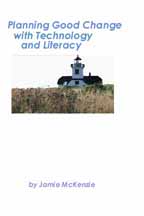
Chapter 2
|
|
This chapter is reproduced Click here to download Adobe Acrobat version of this chapter.
First things first. Platitudes may be time worn and overly simple, but they often capture an essential truth. First things first. "That's obvious!" someone might grumble. But it is startling to note how many districts fail to consider all of the key issues while neglecting, ignoring or underfunding the essential elements of a successful technology/literacy program. It is also surprising to watch the order in which various issues may be considered or addressed (if at all). The metaphor of placing a cart before a horse aptly captures this failure to follow a logical sequence. We should begin by asking what kinds of student learning we hope to promote. Those questions then logically lead to considerations of strategy and resources. Once we have a good sense of our purpose and the activities we plan to launch, we can begin to design a network that serves them well. Design should follow function. In many cases, installation precedes discussions of purpose. Getting wired becomes the goal. When we are planning networked schools, we should agree on a clear educational purpose. We might decide, for example, to create an "information literate school community." (McKenzie, 2000) This choice would then guide the design and development of our program. First things first! First the purpose . . . then the design. |
Back to November CoverCredits: The photographs were shot by Jamie McKenzie. |